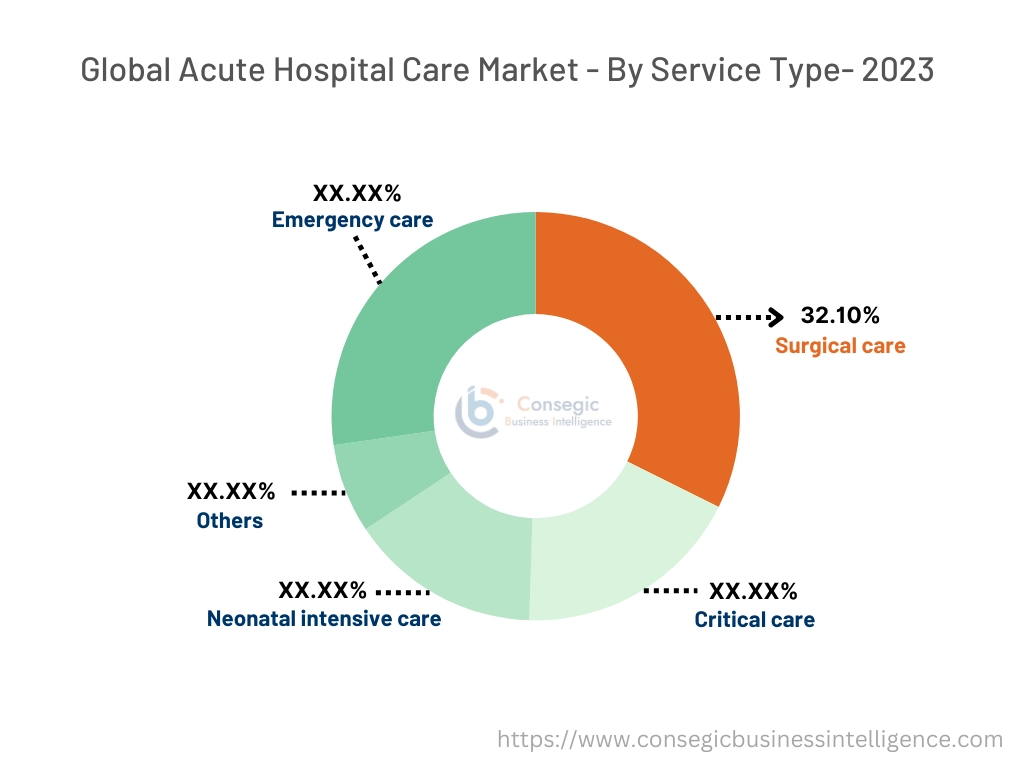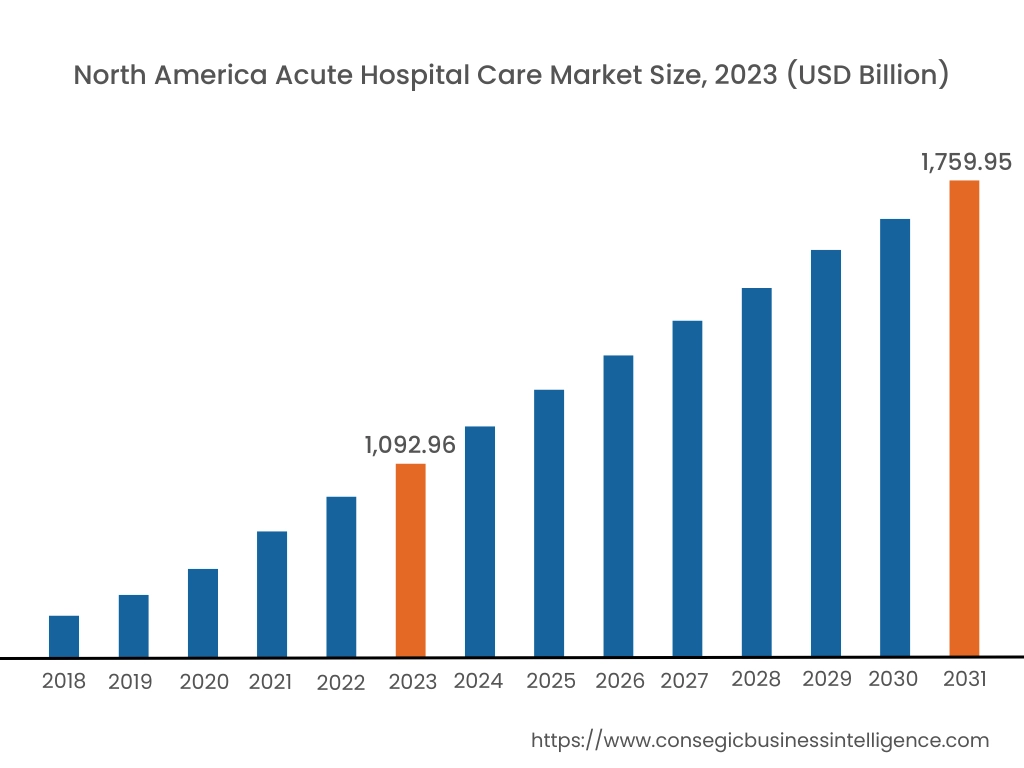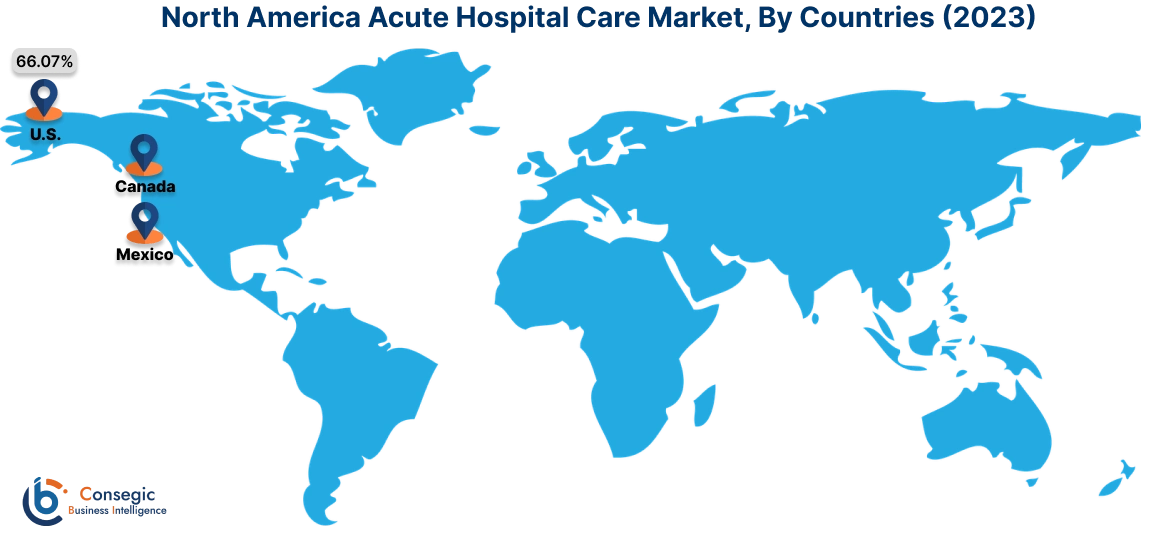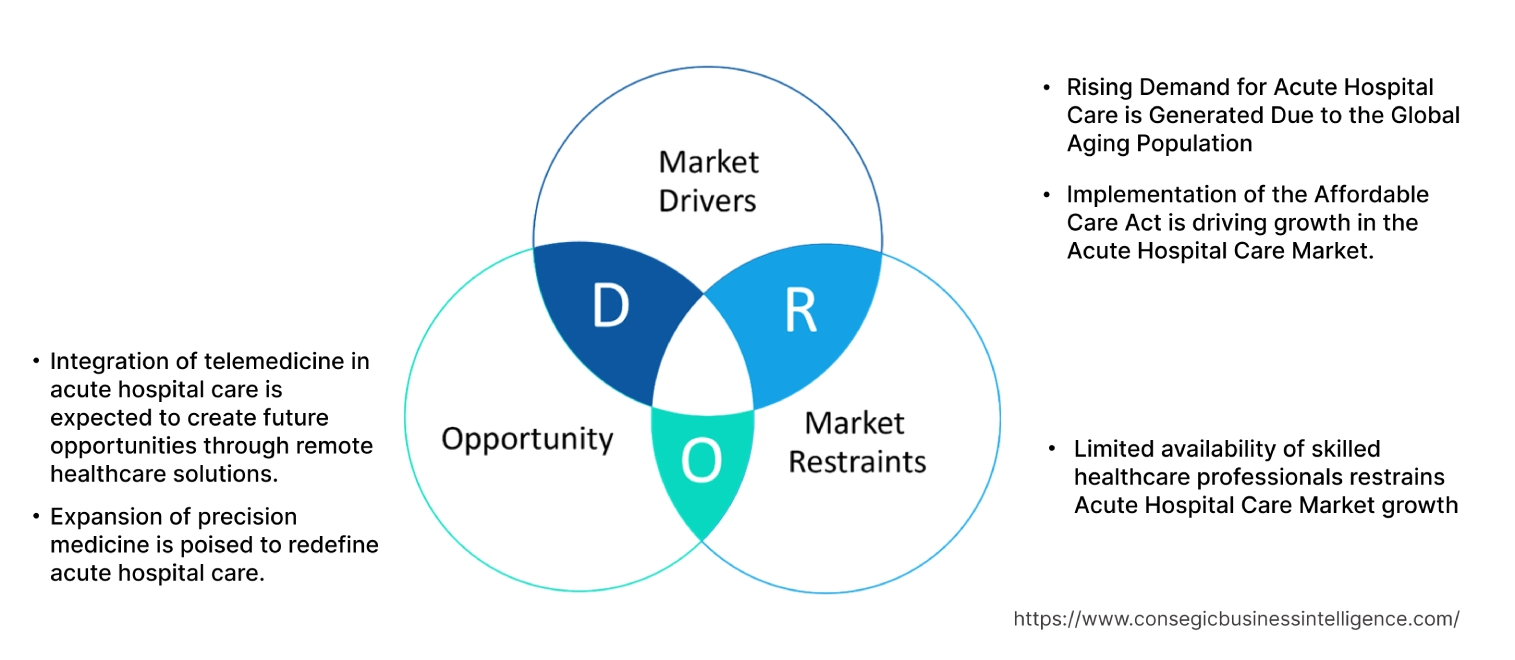Acute Hospital Care Market Size:
Acute Hospital Care Market size is estimated to reach over USD 4,759.21 Billion by 2031 from a value of USD 3,031.79 Billion in 2023, growing at a CAGR of 5.9% from 2024 to 2031.
Acute Hospital Care Market Scope & Overview:
Acute hospital care is a type of healthcare facility that provides short-term, intensive treatment for severe illnesses, injuries, or urgent medical conditions. This type of care typically involves emergency services, surgical interventions, critical care for life-threatening situations, and specialized treatment in areas such as neonatal intensive care, and cardiac care, among others. Acute hospital care is designed to stabilize patients, prevent deterioration of health, and restore health as quickly as possible. It encompasses both inpatient and outpatient services, depending on the severity of the condition.
Acute Hospital Care Market Dynamics - (DRO) :
Key Drivers:
Rising Demand for Acute Hospital Care is Generated Due to the Global Aging Population
As the global population continues to age, there is a significant rise in the number of individuals who require immediate medical attention for acute conditions such as heart attacks, strokes, and others. Older adults are more vulnerable to health issues that necessitate urgent care, often involving intensive medical interventions and hospitalizations.
- According to the United Nations Department of Economic & Social Affairs, the number of people aged 65 years or older worldwide is projected to more than double, rising from 761 million in 2021 to 1.6 billion in 2050. The number of people aged 80 years or older is growing even faster.
Hence, as the elderly population grows, demand for acute hospital care services, especially in critical and emergency care, will continue to rise significantly.
Implementation of the Affordable Care Act is driving growth in the Acute Hospital Care Market.
The Affordable Care Act (ACA) has several implications for acute hospital care, including reducing hospitalizations and readmissions. The ACA aims to reduce unnecessary hospitalizations and readmissions for ambulatory care-sensitive conditions. The government implements certain rules and regulations that significantly influence the demand for acute hospital care by promoting access to healthcare services. The Affordable Care Act in the U.S. is a comprehensive healthcare reform law enacted in 2010 aimed at expanding health insurance coverage, improving access to hospital care, and reducing healthcare costs in the U.S.
- According to the American Journal of Surgery, as of early 2023, approximately 40 million people across the United States have gained coverage through the Affordable Care Act, and change/increase by an average of 6.6 % in Maryland in 2023 and there was a 179.2 % increase in patients undergoing bariatric surgery post-implementation of Affordable Care Act (ACA).
Thus, the execution of healthcare laws such as ACA has significantly increased access to medical services, resulting in greater demand for acute hospital care and fostering improved patient outcomes through timely interventions.
Key Restraints :
Limited availability of skilled healthcare professionals restrains Acute Hospital Care Market growth
The shortage of skilled healthcare professionals, including doctors, nurses, and specialized medical staff, poses a significant challenge to the acute hospital care market. As demand for acute services grows, hospitals and healthcare facilities face difficulties in recruiting and retaining adequately trained personnel. This shortage is especially prominent in low and lower-middle-income countries, where access to highly skilled healthcare workers is limited.
- According to the World Health Organization, there will be a projected shortfall of 10 million health workers by 2030, mostly in low and lower middle-income countries.
The shortage of skilled health professionals limits the capacity of hospitals to provide high-quality, timely acute care, affecting overall market growth & patient outcomes.
Future Opportunities :
Integration of telemedicine in acute hospital care is expected to create future opportunities through remote healthcare solutions.
Telemedicine is emerging as a vital future opportunity for acute hospital care by enabling real-time patient monitoring and consultations without the need for physical hospital visits. Telemedicine is basically the use of digital communications such as video conferencing, mobile apps, and remote monitoring tools, to provide healthcare services globally. It enables patients to receive treatments, and consultations without physically visiting the hospital.
- According to the Journal of Epidemiology and Global Health, the growing global market size of telemedicine is expected to maintain projected annual growth between 13 and 27% worldwide for upcoming years from 2023.
In conclusion, telemedicine is set to transform acute hospital care by improving accessibility, reducing hospital congestion, and optimizing care delivery across broader populations.
Expansion of precision medicine is poised to redefine acute hospital care.
Precision medicine also called personalized medicine involves tailoring medical treatment to individual characteristics, which will be beneficial in acute care situations. The rise of precision medicine presents a unique opportunity for acute care providers to enhance treatment effectiveness and patient outcomes. This approach not only increases the likelihood of successful interventions but also reduces the risk of adverse reactions and improves overall care quality.
- According to the conference paper on Prospects of the Global Precision Medicine Market, the global precision medicine market is expected to reach USD 146.8–278.6 billion by 2030 and the compound annual growth rate (CAGR) from 2020 to 2030 is 11.13%.
Hence, the integration of precision medicine into acute hospital care shortly is set to reform patient care standards and improve health outcomes.
Acute Hospital Care Market Segmental Analysis :
By Service Type :
By Service Type, the acute hospital care market is divided into emergency care, surgical care, critical care, neonatal intensive care, and others.
Trends in the service type:
- Technological advancement such as the use of robotics in minimally invasive surgical procedures in surgeries is transforming the overall surgical care.
- The emergency department in the hospital is experiencing major growth due to a surge in accidents, injuries, and trauma conditions, among others.
The surgical care segment accounted for the largest revenue share of 32.10% in the year 2023.
- The increasing prevalence of chronic diseases and injuries creates a high demand for both elective and emergency surgical procedures.
- Additionally, advancements in surgical technology, including minimally invasive techniques and robotic surgery, have improved patient outcomes and reduced recovery times, making surgery a preferred option for many patients.
- Furthermore, hospitals are investing significantly in minimally invasive techniques and surgical equipment.
- For instance, in 2024, in Florida, Hospital is incorporating innovations such as robotic and single port surgery in minimally invasive surgical procedures.
- In conclusion, the prevalence of diseases and technological advancement are fueling the growth of the surgical care market.
The emergency care segment in the service type is expected to grow at the fastest CAGR over the forecast period.
- Emergency care refers to the immediate medical attention provided for acute illnesses and injuries.
- The demand for emergency services is rising sharply due to an increase in the number of acute medical conditions and traumatic injuries.
- Hospitals are experiencing heightened patient visits in their emergency departments, necessitating expanded capabilities.
- In 2024, in Manchester, the National Institute for Health and Care Research (NIHR) HealthTech Research Centre (HRC) in Emergency and Acute Care is officially launched with £3 million investment. The center plans to co-develop new technology solutions in partnership with National Health System clinicians, academics, and the health tech industry.
- Thus, it can be seen that the emergency care segment is expected to continue its rapid growth trajectory, driven by increasing patient needs, urbanization & technological advancements.

By Medical Condition:
By Medical Condition, the Acute Hospital Care Market is divided into trauma & injury, cardiovascular conditions, neurological conditions, oncology, and others.
Trends in the medical condition:
- The Acute Hospital Care Market is experiencing a notable increase in demand for trauma and injury services, driven by higher rates of accidents and enhanced focus on hospital readiness and specialized care facilities.
- The emergency department in the hospital is experiencing major growth due to accidents, injuries, trauma conditions & others.
The trauma & injury segment accounted for the largest market share of the Acute Hospital Care Market by medical condition.
- Trauma & injury encompasses a wide range of conditions resulting from accidents, falls, and other unexpected events requiring acute hospital care.
- Trauma cases, including fractures, head injuries, and soft tissue injuries are prevalent globally.
- Hospitals are increasingly focusing on enhancing their trauma care capabilities, including developing specialized trauma centers and training staff to manage critical injuries effectively.
- The trauma & injury segment is expected to remain dominant in the acute hospital care market, driven by the high incidences of trauma cases and hospital preparedness.
The cardiovascular conditions segment in the medical condition is expected to grow at the fastest CAGR over the forecast period.
- Cardiovascular conditions which include heart disease, hypertension, and stroke, represent a significant portion of acute medical issues requiring immediate attention.
- The growing elderly population is a significant driver of the increase in cardiovascular cases. Older individuals are more susceptible to heart-related conditions, leading to a higher demand for acute cardiovascular interventions.
- Innovations in medical technology such as Artificial Intelligence are enhancing the diagnosis and treatment of cardiovascular conditions.
- For instance, Mayo Clinic has implemented Artificial Intelligence tools and technology into clinical practice for detecting heart disease, treating strokes faster, and enhancing diagnostic radiology capabilities.
- In summary, the cardiovascular segment is experiencing rapid growth due to the rising prevalence of heart diseases and advancements in medical technology.
By Facility Type:
By facility type, the acute hospital care market is divided into general hospitals, specialty hospitals, government/public hospitals, and private hospitals, among others.
Trends in the facility type:
- General hospital consistently leads in terms of patient volume and service diversity, solidifying their dominant position in the acute hospital care market.
- The growing emphasis on specialized care is reshaping the acute hospital care landscape, making specialty hospitals a critical component.
The general hospital segment accounted for the largest market share of acute hospital care market by facility type.
- General hospitals are multi-functional healthcare facilities providing a wide range of services, including emergency, surgical, outpatient care and others.
- Patients with multiple conditions can receive coordinated care across specialties, increasing efficiency in acute hospital settings.
- General hospitals are expanding and building their partnerships to provide better acute care and treatment to patients.
- For instance, in 2024, GE HealthCare and Tampa General Hospital will expand Long-term partnership to benefit patients and clinicians across the State of Florida. They announced an agreement to deploy GE HealthCare's Imaging and Ultrasound technology solutions to benefit clinicians and patients in Tampa General Hospital Imaging's outpatient facilities across the state of Florida.
- Therefore, the ability to cater to the broader spectrum of medical needs ensures that general hospital dominates the acute hospital care market by facility type.
The specialty hospital segment in the facility type is expected to grow at the fastest CAGR over the forecast period.
- A specialty hospital is a medical provision that focuses on treatment & care for specific medical conditions or patient.
- The growth of specialty hospitals is primarily driven by the increasing demand for specialized medical services and the rising prevalence of chronic diseases.
- Patients are increasingly seeking specialized care for specific conditions, such as cardiology, oncology, orthopedics and others.
- Specialty hospitals often demonstrate better cost efficiency and quality of care compared to general hospitals due to their focused expertise and streamlined operations.
- In 2024, Cleveland Clinic Children's Expands Primary Care and Specialty Services in Akron, Ohio, United States.
- Thus, the growth of specialty hospitals is driven by increasing demand, cost efficiency, and patient preferences.
By End-User:
By end-user, acute hospital care market is categorized into inpatient, outpatient & healthcare professional.
Trends in the End Use :
- The Acute Hospital Care Market is characterized by the dominance of the inpatient segment, driven by the need for extensive medical treatment and continuous patient care for complex health conditions.
- Outpatient acute hospital segment is growing thereby reducing the need for hospital visits, providing quality care, and improving health outcomes.
The inpatient segment accounted for the largest market share of Acute Hospital Care Market by end-user
- Inpatient acute hospital care involves medical treatment that requires patients to be admitted to a hospital.
- It remains vital within the acute hospital care framework, serving as a critical component for managing severe health issues.
- Inpatient care offers a coordinated approach to a treatment that involves multidisciplinary teams, providing comprehensive services ranging from surgery to rehabilitation.
- According to the Australian Institute of Health & Welfare, there were 12.1 million hospitalizations for admitted patients in 2022–23 — a rate of 415 hospitalizations per 1,000 population.
- Thus, the demand for inpatient acute hospital care is dominating due to the necessity of comprehensive care for severe health issues.
The outpatient segment of the end-user is expected to grow at the fastest CAGR over the forecast period.
- Outpatient acute hospital care refers to medical services provided to patients who do not require an overnight stay in a hospital.
- There has been a significant shift towards outpatient services, driven by advancements in medical technology and a focus on patient-centered care.
- Many surgical procedures that once required hospitalizations can now be performed in outpatient settings, allowing for quicker recovery times and reduced costs.
- According to National Health System (England) in 2022-23, there were 124.5 million outpatient appointments.
- In conclusion, there is growing emphasis on outpatient acute hospital care improving patient-centered care, and overall operational efficiency thereby reducing costs.
Regional Analysis:
The regional segment includes North America, Europe, Asia Pacific, the Middle East and Africa, and Latin America.

In 2023, North America accounted for the highest market share at 36.05% and was valued at USD 1,092.96 Billion, and is expected to reach USD 1,759.95 Billion in 2031. In North America, the U.S. accounted for the highest market share of 66.07% during the base year of 2023. North America, particularly the United States, boosts a highly developed infrastructure with a vast network of hospitals and healthcare facilities. Additionally, the region is known for its significant national health expenditure which explains the continual investments in the provision of health services, family planning activities, nutrition activities, and emergency aid designated for health.
- In November 2024, the Government of Newfoundland and Labrador announced a new acute care hospital campus in Kenmount Crossing, Canada. It will help modernize the delivery of health care services on the Northeast Avalon and the entire province.
Hence, North America consistently delivers exceptional acute hospital services with robust healthcare infrastructure and significant healthcare expenditure.

Asia-Pacific is expected to witness the fastest CAGR over the forecast period of 6.3% during 2024-2031. The region faces a growing burden of chronic diseases, necessitating more acute care services. The expansion of health insurance coverage and the development of new healthcare facilities are improving access to acute hospital care. Moreover, countries in the Asia-pacific region such as India, are significantly increasing their healthcare budgets and integrating technology in delivering acute hospital care.
- According to the Future Health Index 2023 report by Philips, the Asia-Pacific region is shifting to a tech-enabled distributed model of care. The report gathered responses from nearly 3,000 healthcare leaders and young professionals in 14 countries. Based on the report, two-thirds or 66% of respondents said they are "well-equipped to work effectively" with new care delivery models.
In conclusion, the acute hospital market in Asia-pacific is expanding supported by the growing prevalence of chronic diseases, health insurance coverage, and technological advancements.
The acute hospital care market in Europe is characterized by well-established healthcare systems, increased government spending, and a focus on specialized care. With a rising elderly population and growing rates of chronic diseases, the demand for acute care services has significantly increased. The market benefits from advanced healthcare infrastructure, particularly in Western Europe and the adoption of digital health solutions like telemedicine is further improving acute care delivery. However, economic challenges in some Eastern European nations slow down the market growth.
In Latin America, the acute hospital care market is growing, but challenges such as uneven healthcare infrastructure and access to resources exist. Countries like Brazil and Mexico are experiencing increasing demand for hospital car due to an aging population and rising chronic disease rates. The implementation of universal healthcare programs in some countries is also expanding access to hospital services, but limited investment in healthcare infrastructure is a key restraint.
The acute hospital care in the Middle East and Africa region is growing rapidly, especially in Gulf Cooperation Council (GCC) countries, driven by increasing government investment in healthcare infrastructure. However, many countries in Africa face significant challenges due to a lack of resources, which hinders access to quality acute care services.
Top Key Players & Market Share Insights:
The acute hospital care market is highly competitive with major players providing products and services to the national and international markets. Key players are adopting several strategies in research and development (R&D), product innovation, and end-user launches to hold a strong position in the global acute hospital care market. Key players in the acute hospital care industry include -
- HCA Healthcare, Inc. (United States)
- Tenet Healthcare Corporation (United States)
- Universal Health services, Inc (United States)
- Ramsay Health Care (Australia)
- Cleveland Clinic (United States)
- Community Health Systems, Inc. (United States)
- Ascension Health (United States)
- Mayo Clinic (United States)
- Fresenius Medical Care (Germany)
- IHH Healthcare (Malaysia)
Recent Industry Developments :
Partnerships and Collaborations:
- According to Cardinal Health, Acute Hospital Care at Home (AHCaH) waiver program grants healthcare providers the flexibility to deliver a comprehensive range of acute care services in a patient's home. CMS reports that, since the waiver took effect, it has enabled more than 331 hospitals across 136 health systems and 37 states to embrace hospital-at-home programs in the United States.
Business Expansion:
- In May 2023, WHO announced the Acute Care Action Network (ACAN) for emergency, critical, and operative care. The ACAN is receiving strategic collaboration and support from the Laerdal Foundation and the American Heart Association – two key partners in the ECO community for coordinated and high-impact action in countries, with an emphasis on targeted support for the implementation of WHO tools in resource-limited settings.
Acquisitions:
- Prime Healthcare has entered into an asset purchase agreement with Ascension for the sale of Ascension Illinois hospitals, associated physician practices, and post-acute and senior living facilities.
Acute Hospital Care Market Report Insights :
| Report Attributes | Report Details |
| Study Timeline | 2018-2031 |
| Market Size in 2031 | USD 4,759.21 Billion |
| CAGR (2024-2031) | 5.9% |
| By Service Type |
|
| By Medical Condition |
|
| By Facility Type |
|
| By End-User |
|
| By Region |
|
| Key Players |
|
| North America | U.S. Canada Mexico |
| Europe | U.K. Germany France Spain Italy Russia Benelux Rest of Europe |
| APAC | China South Korea Japan India Australia ASEAN Rest of Asia-Pacific |
| Middle East and Africa | GCC Turkey South Africa Rest of MEA |
| LATAM | Brazil Argentina Chile Rest of LATAM |
| Report Coverage |
|
Key Questions Answered in the Report
How big is the Acute Hospital Care Market? +
Acute Hospital Care Market size is estimated to reach over USD 4,759.21 Billion by 2031 from a value of USD 3,031.79 Billion in 2023, growing at a CAGR of 5.9% from 2024 to 2031.
What specific segmentation details are covered in the Acute Hospital Care Market report? +
The Acute Hospital Care Market report includes specific segmentation details for the service type, medical condition, facility type, and end-user.
Which is the fastest growing region in Acute Hospital Care Market? +
Asia-Pacific is the fastest-growing region in the Acute Hospital Care Market
Who are the major players in the Acute Hospital Care Market? +
The key participants in the Acute Hospital Care market are HCA Healthcare, Inc. (United States), Tenet Healthcare Corporation (United States), Community Health Systems, Inc. (United States), Ascension Health (United States), Universal Health services, Inc (United States), Mayo Clinic (United States), Ramsay Health Care (Australia), Cleveland Clinic (United States), Fresenius Medical Care (Germany), IHH Healthcare (Malaysia).


